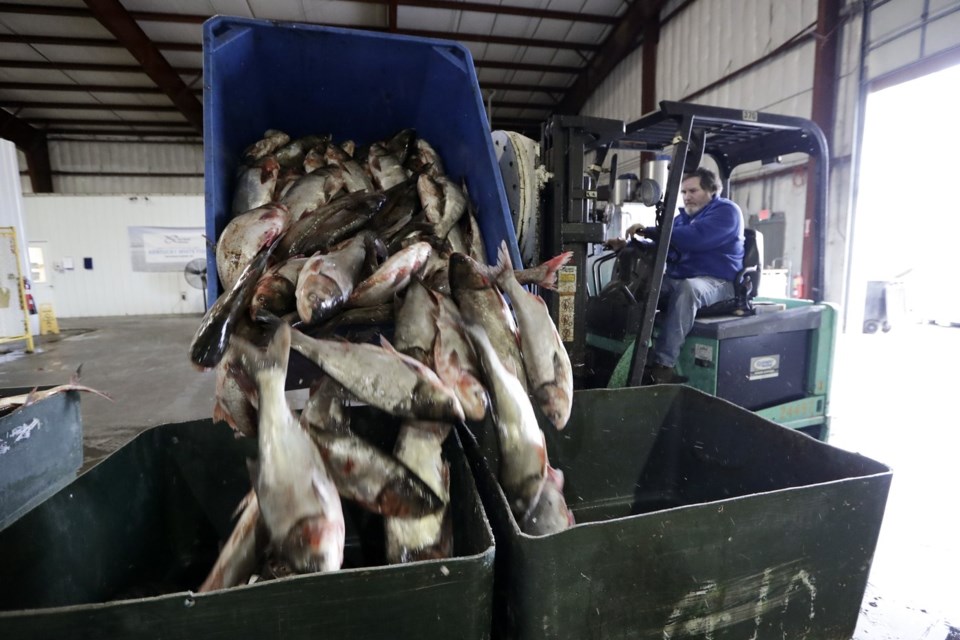A stalemate between President Donald Trump and Illinois Gov. JB Pritzker that threatened a $1.2 billion plan to keep invasive carp from reaching the Great Lakes appears to have been settled after the Trump administration offered assurances it will cover its share of the costs.
After a delay that has stretched on since February, Illinois officials are set to resume closing on property they need to continue work on a project that will generate vast bubble curtains to deter the carp, stun them with electrical fields and play sound frequencies to disorient them.
Here's what to know:
The project has been on the drawing board for years
The U.S. Army Corps of Engineers along with state officials in Illinois and Michigan have been planning since 2020 to install a gantlet of technologies in the Des Plaines River near Joliet, Illinois, to deter invasive carp from entering Lake Michigan.
The Corps and the states signed a deal in 2024 to work together on the project using $226 million allocated through the Bipartisan Infrastructure Law. And elements of the Water Resources Development Act adopted last year call for the federal government to cover 90% of operating and maintenance costs.
Pritzker demands assurances from Trump
Construction on the project began in January. Pritzker's administration was set to close in February on a parcel of property for the project and transfer it to the Corps.
Everything appeared on track until late January, when the Trump administration froze federal grants and loans as it reviewed whether spending aligned with Trump's priorities on issues such as climate change and diversity. The administration rescinded the freeze less than two days later but questions persist about the federal government's spending commitments.
Pritzker, a billionaire heir to the Hyatt hotel empire and a potential 2028 Democratic presidential contender, is one of Trump’s fiercest critics. He has described the early months of the Trump administration as “true villainous cruelty by a few idiots.”
Days before Illinois was to finalize a property deal for the carp project, Pritzker hit pause and demanded assurances that the federal government would honor its spending commitment. Site preparation has continued since then, but substantial work to install technology has been on hold.
Trump signals the project is a priority
The White House issued a memo late Friday saying the Trump administration recognized the threat invasive carp pose to Great Lakes recreation and fishing and that it's committed to protecting the lakes.
The federal government is prepared to do its part so long as states cooperate, according to the memo, which calls on Illinois to complete the property deal by July 1 and promises the federal government will streamline permitting and environmental reviews.
“My Administration fully supports preventing the spread of invasive carp,” the memo said. “The State of Illinois, where the (project) is located, must cease further delay in cooperating with this effort, for the sake of its own citizens and economy and for the sake of all of the Great Lake States.”
Pritzker's office issued a news release late Friday evening saying the governor was satisfied.
Work on the project isn't slated to finish until 2032, but Joel Brammeier, president and CEO of the nonpartisan Alliance for the Great Lakes, said Monday that prospects suddenly look dramatically better than they did last week.
“We're back to business as usual. That's a good thing,” he said.
Why the carp would be bad news for the Great Lakes
Four species of carp were imported to the U.S. from Asia in the 1960s and 1970s to clear algae from sewage ponds and fish farms in the Deep South. They escaped into the Mississippi River and have moved north into dozens of tributaries in the central U.S.
Government agencies, advocacy groups and others have long debated how to prevent the fish from reaching the Great Lakes, where scientists say they could out-compete native species for food and habitat in waterways where the fishing industry is valued at $7 billion.
A shipping canal that forms part of the link between the Mississippi and Lake Michigan has a network of fish-repelling barriers, which the Corps says is effective, but critics consider inadequate.
The new project at the Brandon Road Lock and Dam on the Des Plaines River near Joliet will provide another layer of protection at a downstream choke point between the Illinois River, which is infested with invasive carp, and Lake Michigan.
“I’m hopeful everyone is taking this project seriously now and we’re not going to see any more delays,” Brammeier said.
Todd Richmond, The Associated Press



